It’s been a strange season for the Church of England as most people reading this will know. I think I have to go back around 20 years or so to find a similar time. We’ve been rocked by the women bishops debate, unable to respond effectively to the government proposals on marriage and reflecting quietly, I guess, on the first census results.
For many people, all of this is very disorientating. Here are some reflections as we find try and re-orientate ourselves in Advent and prepare for Christmas. I am writing to myself as much as to anyone else.
Lift up your hearts!
In the midst of all of these storms, the line from the liturgy which has meant most to me over the last few weeks is the call at the beginning of the Eucharistic Prayer to the whole people of God: Lift up your hearts.
The call is present in the earliest prayers of the Church. It has deep biblical roots in Psalm 25.1 (“To you O Lord, I lift up my soul”). It has roots as well in the final verses of Psalm 24 which we read in Advent: “Lift up your heads, O gates and be lifted up O ancient doors”.
It is a call for narrow hearts to be made wider and deeper as we receive God’s love. It’s a call for bruised and broken hearts to be lifted up to God’s tender mercy. It’s a call for hearts which are too fixed and mired in earthly things to be raised to heaven.
It is a call to me and I think to all of us in one of the most demanding Advent seasons I can remember, whatever our views on the issues of the day, to lift up our hearts to God’s greatness, to God’s mercy, to God’s glory revealed in the gift of his Son Jesus Christ. It is only as we make Psalm 25.1 our own (“To you O Lord, I lift up my soul”) that we ourselves are prepared to say to God’s own people and to the world around us: “Lift up your hearts!”
The failure narrative and the change narrative
The census results continue to show a significant shift taking place in society, though not as rapidly as some predicted. The proportion of people identifying themselves as Christian is now around six in ten, down from seven in ten in 2001. The number claiming no religion has doubled.
The figures reveal a deep shift which has been unfolding for a century or more. A few years ago I tried to describe the two most common responses to that shift in the life of the church as the failure narrative and the change narrative[1].
The failure narrative argues that this fundamental shift is primarily caused by our own failures as a church. If only we believed more deeply, prayed with more faith, changed in this way or that (depending on who is speaking) then we wouldn’t be seeing this fundamental shift in Christian allegiance.
There has been evidence of the failure narrative all around us in the press over the last few weeks as the story is framed as “Church of England loses touch with the nation”.
The failure narrative is an artificial construct often used to argue for particular changes in the life of the Church. I’ve heard it used to argue for greater use of the Prayer Book, changes to our understanding of marriage or more (or less) emphasis on fresh expressions of church. It produces poor fruit in the life of God’s people: a sense of depression rather than hope; a blaming of others or ourselves; division; and a debilitating loss of morale. It’s a seductive argument in difficult times but it is medicine which makes the patient more poorly still.
The failure narrative only deepens cynicism and despair. It blinds us to the many good things happening in the life of local churches and the church nationally. It is dependent on the idea of a mythical golden age when Britain was a Christian country and church life was straightforward. If you read the accounts of the time it was no easier to be a Christian in 1840, 1912 or 1950.
But the failure narrative fails most of all because it is simply too church-centred. It ignores the reality that the Church exists within a larger global and national culture which is changing in fundamental ways. It is those larger changes, beyond the control of any single church, which set the climate in which we operate as Christians. As we look back over the last century those changes have been enormous – the deep shifting of the tectonic plates of our society. It is not surprising that the relationship between our culture and Christian faith is changing in very significant ways. But we are simply starting in the wrong place if we begin from the belief that it is all our fault.
Our world is changing rapidly. Yes, we need to debate how to respond to those changes. Sometimes individual churches get that right and sometimes wrong and sometimes we just don’t know. But the fundamental changes are much bigger than any single church.
The biggest piece of learning for me from the Synod of Bishops in Rome was that the Church all over the world is having the same conversation. The context for that conversation is the difficulty of passing on the Christian faith in the present global, secularizing culture. We do need to learn new skills, focus our energies in different ways and constantly make decisions about the gospel’s relationship to new and evolving realities. But we need to begin from the common starting place that the whole Church, all across the world, is facing similar challenges and they are caused primarily by fundamental changes beyond our control.
Hope is a virtue Advent is the season to remember that the most vital virtue to cultivate as the foundation for that ongoing conversation is hope. Every Christian should repeat to themselves every morning for a year that hope is not a mood but a virtue. It is not something we feel but something we practise.
In our wider culture, hope has lost all currency as a virtue. Hope has become a mood: a vaguely positive feeling which fluctuates with the evidence around us, with the weather, with our temperament.
In the Christian tradition, hope is not a mood at all. “Meanwhile these three remain” writes St. Paul in 1 Corinthians 13, “Faith, hope and love. But the greatest of these is love”.
We hold onto a sense that love is not a feeling but a virtue. We just about hold onto a sense that faith can be a virtue – something to be nurtured and exercised as trust and confidence. But we are losing hope (literally) as a virtue, a strength of character, to inhabit and live in as a quality in the leadership we exercise and the example we set. Christians are called to be people of hope not because of the evidence but because of the truth revealed in Christ which is deeper and stronger than the evidence around us.
Finding the compass
I also argued in Jesus People that in a time of uncertainty we often find ourselves as a Church lost and without a map in strange territory. In those moments, we need a compass. The compass for the church in navigating through questions of great uncertainty must be striving to reflect the character of Christ, as individuals and as a Church. And, yes, of course, we will fail to do that over and over again. That’s why we need to hold onto hope, not only for the world but for ourselves.
The character of Christ is reflected in many places in the scriptures but most clearly and concisely for me in the beatitudes of Matthew’s gospel. We are called as a church, local and national, to be poor in spirit, mourning for the suffering in the world, meek, hungry and thirsty for justice, merciful, pure in heart, peace makers, and willing to suffer for what is right. That is what it means to be a Christ-like church. Just to write that list (or to read it) is to recognize how far we are from where we are meant to be – but that is the kind of wholesome repentance which can lead to renewal and to real change together.
Moving to the front foot
But the conversations in Rome revealed and confirmed that there is another primary reponse the Church needs to make to the changing global situation. That is to steadily shift our resources to the process of forming and shaping disciples. The churches which are learning how to make headway and to thrive in the present climate are the churches which are making this shift. Again this is true of local churches, of dioceses and provinces and of denominations.
This means recovering, encouraging and in some case discovering afresh the great classical intellectual disciplines and pastoral practices which the Church has always needed in such moments of cultural change.
These include:
- Apologetics: defending and commending the faith through philosophy, the sciences, the arts and popular culture
- Contextual mission: the ability to go beyond the church in loving service and careful listening, to pioneer new ecclesial communities as part of the wider church
- Initial proclamation: the loving and careful communication of the gospel to those who have not heard it before
- Catechetics: the intentional nurture and formation of disciples who are well grounded in faith and able to live counterculturally
These disciplines will be the engine room of the Church in the next generation. Any church which wants to move forwards (and by church I mean local church or diocese or denomination) must steadily shift resources and creativity and energy towards these four great disciplines. They need to be at the heart of ministerial training and ministerial practice and at the core of our theological endeavour. After striving to form the character of Christ, this is the fundamental direction of change we need and which we have been engaging in for a generation.
And finally
So I say to every Christian reading this and to myself: Lift up your hearts! Remember we are living through a time of massive change. Our vocation is to be a people of hope, whatever is happening around us; a people in whom the character of Christ is being formed, be it ever so slowly; a people shifting our resources steadily to the engine room of mission.
Thanks for reading and I pray you discover the reality of Christ afresh in the Advent and Christmas season.
[1] See Jesus People: what next for the church? CHP, 2004


